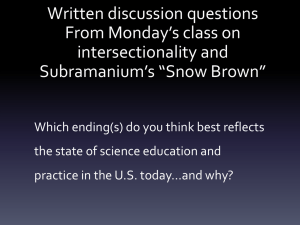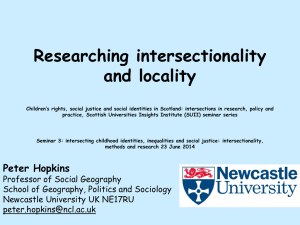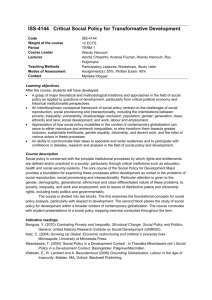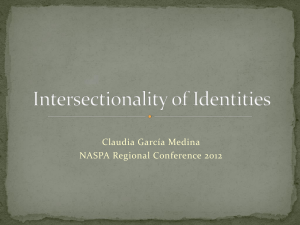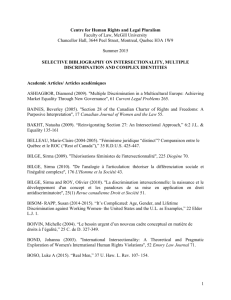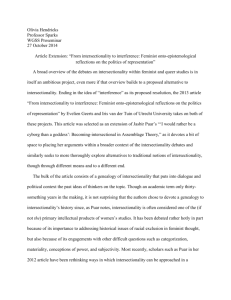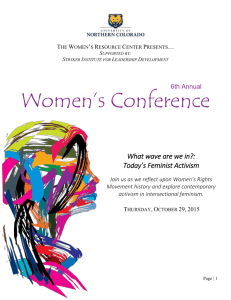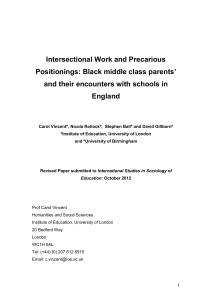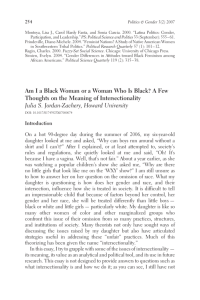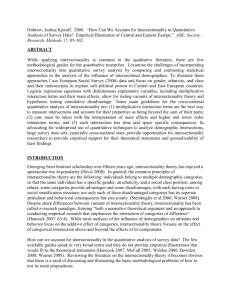THE INTERSECTIONALITY PARADIGM AND CONSUMER
advertisement
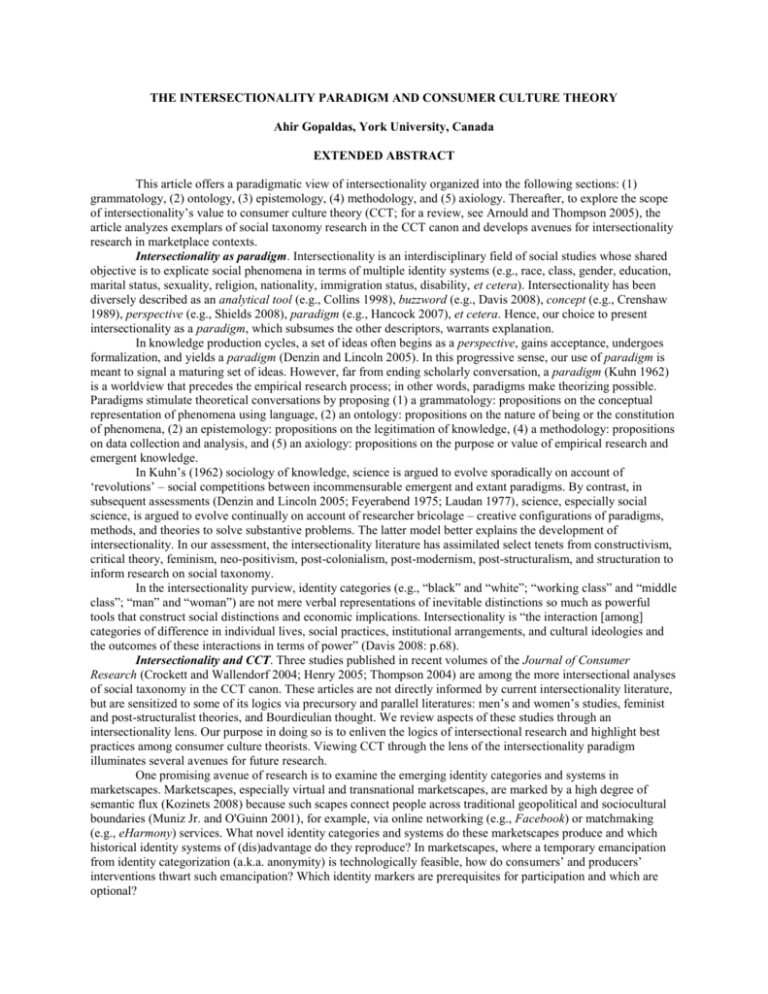
THE INTERSECTIONALITY PARADIGM AND CONSUMER CULTURE THEORY Ahir Gopaldas, York University, Canada EXTENDED ABSTRACT This article offers a paradigmatic view of intersectionality organized into the following sections: (1) grammatology, (2) ontology, (3) epistemology, (4) methodology, and (5) axiology. Thereafter, to explore the scope of intersectionality’s value to consumer culture theory (CCT; for a review, see Arnould and Thompson 2005), the article analyzes exemplars of social taxonomy research in the CCT canon and develops avenues for intersectionality research in marketplace contexts. Intersectionality as paradigm. Intersectionality is an interdisciplinary field of social studies whose shared objective is to explicate social phenomena in terms of multiple identity systems (e.g., race, class, gender, education, marital status, sexuality, religion, nationality, immigration status, disability, et cetera). Intersectionality has been diversely described as an analytical tool (e.g., Collins 1998), buzzword (e.g., Davis 2008), concept (e.g., Crenshaw 1989), perspective (e.g., Shields 2008), paradigm (e.g., Hancock 2007), et cetera. Hence, our choice to present intersectionality as a paradigm, which subsumes the other descriptors, warrants explanation. In knowledge production cycles, a set of ideas often begins as a perspective, gains acceptance, undergoes formalization, and yields a paradigm (Denzin and Lincoln 2005). In this progressive sense, our use of paradigm is meant to signal a maturing set of ideas. However, far from ending scholarly conversation, a paradigm (Kuhn 1962) is a worldview that precedes the empirical research process; in other words, paradigms make theorizing possible. Paradigms stimulate theoretical conversations by proposing (1) a grammatology: propositions on the conceptual representation of phenomena using language, (2) an ontology: propositions on the nature of being or the constitution of phenomena, (2) an epistemology: propositions on the legitimation of knowledge, (4) a methodology: propositions on data collection and analysis, and (5) an axiology: propositions on the purpose or value of empirical research and emergent knowledge. In Kuhn’s (1962) sociology of knowledge, science is argued to evolve sporadically on account of ‘revolutions’ – social competitions between incommensurable emergent and extant paradigms. By contrast, in subsequent assessments (Denzin and Lincoln 2005; Feyerabend 1975; Laudan 1977), science, especially social science, is argued to evolve continually on account of researcher bricolage – creative configurations of paradigms, methods, and theories to solve substantive problems. The latter model better explains the development of intersectionality. In our assessment, the intersectionality literature has assimilated select tenets from constructivism, critical theory, feminism, neo-positivism, post-colonialism, post-modernism, post-structuralism, and structuration to inform research on social taxonomy. In the intersectionality purview, identity categories (e.g., “black” and “white”; “working class” and “middle class”; “man” and “woman”) are not mere verbal representations of inevitable distinctions so much as powerful tools that construct social distinctions and economic implications. Intersectionality is “the interaction [among] categories of difference in individual lives, social practices, institutional arrangements, and cultural ideologies and the outcomes of these interactions in terms of power” (Davis 2008: p.68). Intersectionality and CCT. Three studies published in recent volumes of the Journal of Consumer Research (Crockett and Wallendorf 2004; Henry 2005; Thompson 2004) are among the more intersectional analyses of social taxonomy in the CCT canon. These articles are not directly informed by current intersectionality literature, but are sensitized to some of its logics via precursory and parallel literatures: men’s and women’s studies, feminist and post-structuralist theories, and Bourdieulian thought. We review aspects of these studies through an intersectionality lens. Our purpose in doing so is to enliven the logics of intersectional research and highlight best practices among consumer culture theorists. Viewing CCT through the lens of the intersectionality paradigm illuminates several avenues for future research. One promising avenue of research is to examine the emerging identity categories and systems in marketscapes. Marketscapes, especially virtual and transnational marketscapes, are marked by a high degree of semantic flux (Kozinets 2008) because such scapes connect people across traditional geopolitical and sociocultural boundaries (Muniz Jr. and O'Guinn 2001), for example, via online networking (e.g., Facebook) or matchmaking (e.g., eHarmony) services. What novel identity categories and systems do these marketscapes produce and which historical identity systems of (dis)advantage do they reproduce? In marketscapes, where a temporary emancipation from identity categorization (a.k.a. anonymity) is technologically feasible, how do consumers’ and producers’ interventions thwart such emancipation? Which identity markers are prerequisites for participation and which are optional? Another promising avenue of research is to compare and contrast historical and emerging identity categories. An example of a market-mediated context where both types of categories predominate is the transnational news media (e.g., CNN International), wherein news anchors, celebrities, and experts reproduce historical identity categories and reify emerging ones simply by repeated invocation of them. Such comparative studies might confirm whether emerging categories are indeed more fluid than historical ones (Firat and Venkatesh 1995) and, if so, whether encouraging continual re-categorization of identities might be one strategy for weakening social structures and strengthening individual agency. After all, intersectionality research is undertaken not merely to identify structural (dis)advantages, but primarily to alleviate them. REFERENCES Arnould, Eric J. and Craig J. Thompson (2005), "Consumer Culture Theory (CCT): Twenty Years of Research," Journal of Consumer Research, 31 (4), 868-82. Collins, Patricia H. (1998), Fighting Words: Black Women and the Search for Justice, Minneapolis: University of Minnesota Press. Crenshaw, Kimberlé (1989), "Demarginalizing the Intersection of Race and Sex: A Black Feminist Critique of Antidiscrimination Doctrine, Feminist Theory and Antiracist Politics," University of Chicago Legal Forum, 1989, 139-67. Crockett, David and Melanie Wallendorf (2004), "The Role of Normative Political Ideology in Consumer Behavior," Journal of Consumer Research, 31 (3), 511-28. Davis, Kathy (2008), "Intersectionality as Buzzword: A Sociology of Science Perspective on What Makes a Feminist Theory Successful," Feminist Theory, 9 (1), 67-85. Denzin, Norman K. and Yvonna S. Lincoln (2005), The Sage Handbook of Qualitative Research, Thousand Oaks, CA: Sage Publications. Feyerabend, Paul K. (1975), Against Method: Outline of an Anarchistic Theory of Knowledge, London: NLB. Firat, A. Fuat and Alladi Venkatesh (1995), "Liberatory Postmodernism and the Reenchantment of Consumption," Journal of Consumer Research, 22 (3), 239. Hancock, Ange-Marie (2007), "When Multiplication Doesn't Equal Quick Addition: Examining Intersectionality as a Research Paradigm," Perspectives on Politics, 5 (1), 63-79. Henry, Paul C. (2005), "Social Class, Market Situation, and Consumers' Metaphors of (Dis)Empowerment," Journal of Consumer Research, 31 (4), 766-78. Kozinets, Robert V. (2008), "Technology/Ideology: How Ideological Fields Influence Consumers' Technology Narratives," Journal of Consumer Research, 34 (6), 865-81. Kuhn, Thomas S. (1962), The Structure of Scientific Revolutions, Chicago: University of Chicago Press. Laudan, Larry (1977), Progress and Its Problems: Toward a Theory of Scientific Growth, Berkeley, CA: University of California Press. Muniz Jr., Albert M. and Thomas C. O'Guinn (2001), "Brand Community," Journal of Consumer Research, 27 (4), 412-32. Shields, Stephanie (2008), "Gender: An Intersectionality Perspective," Sex Roles, 59 (5/6), 301-11. Thompson, Craig J. (2004), "Marketplace Mythology and Discourses of Power," Journal of Consumer Research, 31 (1), 162-80.

